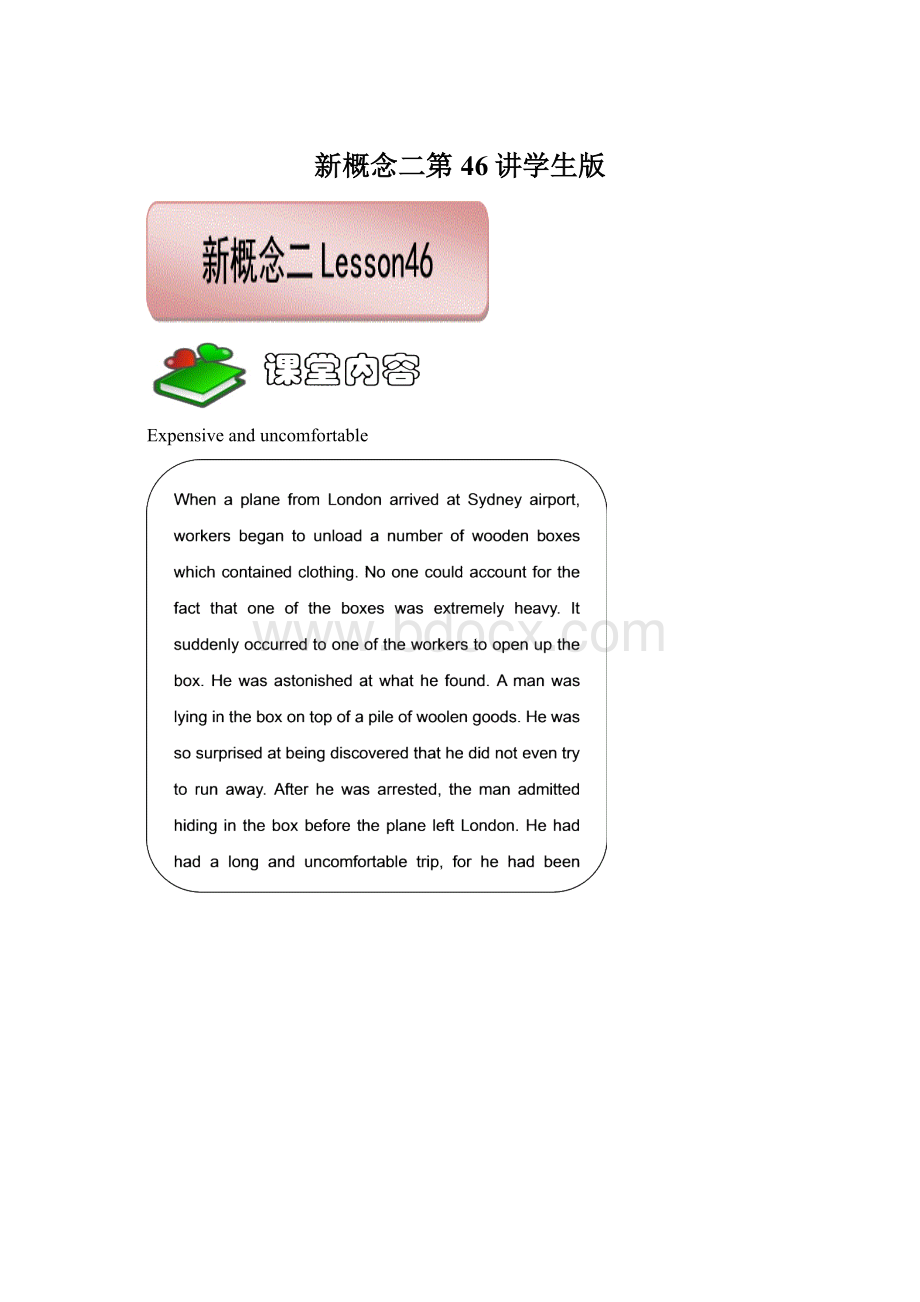新概念二第46讲学生版.docx
《新概念二第46讲学生版.docx》由会员分享,可在线阅读,更多相关《新概念二第46讲学生版.docx(21页珍藏版)》请在冰豆网上搜索。

新概念二第46讲学生版
Expensiveanduncomfortable
Part1Basicwordsandexpressions
1.unloadv.从...卸下货物;卸(货),卸(客)
Thecrewunloadedcratesfromtheship.
船员们从船上卸下板条箱。
Theyareunloadingtheship.
他们正在卸船上的货。
2.anumberof若干,许多
Anumberofpeoplehaveleft.一些人已走了。
Anumberofproblemshavearisen.已经出现了一些问题。
thenumberof……的数量;……的数目
Thenumberoftheapplesis40苹果的数量是40。
Thenumberofstudentsis2000学生的数量是2000人。
3.accountfor说明;证明;对...负有责任
Hecouldnotaccountforhisfoolishmistake.
他无法解释他所犯的荒谬的错误。
Whowillhavetoaccountforthemisprintsinthedictionary?
谁必须对字典中的印刷错误负责?
4.extremelyadv.极端地;极其;非常
Wegotonextremelywell.
我们相处得极好。
Iamextremelysorry.
我非常抱歉。
Thisisanextremelydifficulttask.
这是一项极其困难的任务。
5.occurv.发生
sth.occurredtosb.表示某人想起某事时,这个结构,主语为事,而不是人。
Earthquakesoccurfrequentlyinthisarea.
这一地区经常发生地震。
Itoccurredtohimthatheshouldgotoseeadentist.
他想到他应该立刻去看牙医。
6.openup打开
openupboxes/gifts打开箱子/礼物
Whenhereceivedthegifts,heopenedthemupatonce.他收到礼物后立刻就打开了。
7.beastonishedat对某件事吃惊
Butresultswillcome,andyouwillbeastonishedatthechange.
但是一定会有成果的,而且你一定会对这些成果带来的变化感到惊讶
Samappearsastonishedatthenews/thesound.
这消息/声音似乎使萨姆吃了一惊。
Wewereastonishedatthenewsofhersuddendeath.
她突然去世的消息使我们震惊。
8.ontopof在……顶部
Sheputthebreadontopofapileofothergoods.
她把面包放在一堆其他货物上面。
Siftsugarontopofthecake.
在蛋糕上面撒上糖。
9.apileof一堆;很多
Apileofdirtyclotheslaybythewashingmachine.一堆脏衣服放在洗衣机旁边。
Weputthebooksinpilesonthefloor. 我们把书在地板上堆起来。
10.woolenadj.羊毛的
Shelikestowearwoolensweaterinwinter.
冬天她喜欢穿羊毛衫。
11.goodsn.(常用复数)货物,商品
Ourneighborssoldtheirhouseholdgoodsbeforetheymovedout.
我们的邻居在搬家前把家用品先卖掉。
12.besurprisedat对……感到惊奇
Youwillbesurprisedathisprogress.
你会对他的进步感到惊讶。
13.discoverv.发现
Shediscoveredthatthemanwasaquack.
她发现那人是个庸医。
WhofirstdiscoveredAmerica?
谁最早发现美洲大陆?
14.admitv.承认
admit可作“承认”解释,这时,其后可跟名词、动词的-ing形式、宾语从句或宾语+宾语补足语。
Johnadmittedknowinglittleaboutthesubject.
约翰承认对这个学科了解的不多。
Theboyadmittedthathehadbrokenthewindow.
那男孩承认是他打碎了窗子。
Youmustadmittheworktobedifficult.
你应当承认这项任务是艰巨的。
15.confinev.关在(一个狭小的空间里)
confine..to…把……限制起来
Lastweekend,Tom'smotherconfinedhimtohisroom.
上个周末,汤姆的妈妈把汤姆关在了房间里。
Thethiefwasconfinedinaprison.
窃贼被关押在监狱里。
16.normaladj.正常的,通常的
Thedoctorsaidthechild'stemperaturewasnormal.
医生说孩子体温正常。
Everythingisabsolutelynormal.
一切完全正常。
17.短语复习
trytodosth;trydoingsth;beorderedto;pay…for;thepriceof
Part2StructureandVocabulary
1.workersbegan__________anumberofwoodenboxes.
A.unloadB.tounloadingC.unloadedD.unloading
2.whichboxescontainedclothing?
__________.
A.ThewoodenB.thewoodC.ThewoodyonesD.Thewoodenones
3.Itoccurredtohimtoopenit.Hethought__________it.
A.ofopeningB.toopenC.tohaveopenedD.opening
4.whatdidhefind?
Hewassurprisedatwhat__________.
A.didhefindB.hedidfindC.hefoundD.hehasfound
5.__________atickettoSydney?
£2000
A.HowmanyisB.HowmuchisC.HowmuchhasD.Howmuchcosts
6.Theboxescontainedclothing.Theycontained__________.
A.clothsB.clothC.clothesD.dresses
7.Noonecouldaccountforit.Theycontained__________.
A.explainB.estimateC.interpretD.describe
8.Themanwaslyingontopofa__________ofwoolengoods.
A.carpetB.columnC.bagD.heap
9.Headmittedhidinginthebox.He__________it.
A.announcedB.describedC.confessedD.declared
10.Hehadbeenconfinedtothebox,sohe__________.
A.couldn’tmoveB.couldmoveC.couldn’tsleepD.couldn’trunaway
Key:
DDACBCADCA
Part3Grammar
一、介词
表示时间常用的介词
表示时间常用的介词有at,in,after,until,before,during.
1.at
at多用于表示表示具体的点钟前,如:
atseven,ataquartertoone;也可用于固定搭配中,如:
atnoon,atnight.
2.in
in表示一段时间,用于年、月、世纪、四季或泛指的一天的上午、下午、晚上等。
如:
inthetwenty-firstcentury,inautumn,inthemorning,还可以用于表示“从现在起多长时间之后或多久之后”的短语。
3.on
on主要用于在星期几,具体某一天或某一天的早、中、晚或节日前。
如:
onMid-autumnDay在中秋节
onJune1st在6月1日
Exercise11.SomevolunteersfromBeijingarrivedinShanghai___April29toworkfortheWorldExpo.
A.onB.atC.ofD.to
2.LiLeioftengoestoschool___7:
10inthemorning.
A.atB.forC.onD.in
3.Whatahealthyboy!
Heruns___themorningeverymorning.
A.inB.onC.atD.for
4.SpringisthebestseasoninBeijing.Itusuallycomes____March.
A.onB.inC.toD.at
5.MyuncleiscomingtoBeijing___themorningofMay15.
A.inB.onC.atD.to
4.since,from和for
(1)since指从某时一直延续至今,后街时间点,主句用完成时。
如:
Hehaslivedheresince1993.
(2)form说明开始的时间,谓语可用过去、现在、将来的某种时态。
如:
Fromnowon,IwilllearnEnglishinthemorning.
(3)for指动作延续贯穿整个过程,后接时间段,主句用于完成时。
如:
IhavestudiedEnglishforsixyears.
Exercise2
用for或since填空。
1.JillhasbeeninIreland Monday.
2.TomhasbeeninParis threedays.
5.after
(1)after表示以过去为起点的某一段时间之后,用于过去时。
如:
Theyfinishedtheworkaftertwoyears.
(2)after与时间点连用表示将来某个时间之后。
如:
I’llringyouupaftertwoo’clock.
6.“by+时间点”表示“到……以前为止”,如果by后跟一个过去的时间点应用过去完成时。
如:
Wehadlearned1,000wordsbytheendoflastterm.
7.“during+时间段”与延续性动词连用表示某期间的动作。
如:
Helivedwithusduringtheseyears.
8.until用于否定句中,意为“直到……才”,其前的谓语动词多用瞬间性动词;用在肯定句中,意为“直到……为止”,其前的谓语动词须用延续性动词。
如:
Ididn’tleaveuntilmymothercamehome.
Iwaitedformymotheruntilshecamehome.
9.before和after表示时间,分别意为“在……之前”和“在……之后”。
如:
Pleasebringyourhomeworkbeforeteno’clock.
Exercise31.Theywillleaveaweek____today.
A.fromB.onC.byD.for2.Hesuddenlyreturned_____arainynight.
A.onB.atC.inD.during3.Maryhadfinishedherhomework____thetimeIgothome.
A.untilB.byC.atD.when4.Theydidn’tleavethestation___theygetonthetrain.
A.untilB.byC.afterD.at5.Nanjingisabeautifulcity.Itwon“ChinaHumanHabitatEnvironmentPrize”______2008.
A.atB.onC.inD.by
二、表示地点常用的介词
1.in,on,to
in表示在某一地区之内的某方位(属于该范围);to表示在某一地区之外的某方位(不属于该范围);on表示与某地的毗邻关系。
如:
FujianisinthesoutheastofChina.
ChinaistothewestofJapan.
inonto
2.over,above,on
(1)over指在……的正上方,表示垂直在上。
TherearetwostarsoverHuiTailang.
(2)above表示在上方,属于斜上方。
如:
Raiseyourarmsaboveyourhead.
3.at,in,on
(1)at表示较小的地点
如:
atthebusstop,athome
(2)in表示较大的地方
如:
inChina,intheworld
(3)on表示在一个平面上
如:
onthefarm,ontheplayground
4.infrontof,inthefrontof
(1)infrontof表示“在……之前”(范围外)
如:
Therearesometreesinfrontoftheclassroom.
(2)infrontof表示“在……之前”(范围内)
(3)before所表示的位置关系和infrontof相同,表示“在……前”;“在……面前”。
如:
Hesitsbeforeme.
5.below,under
below表示“在下方或位置低于……”,不一定有垂直在下之意;under表示“在……正下方”。
如:
Therearemanybikesunderthetree.
Thecoatreachesbelowtheknees.
Exercise4
1.Taiwanis____theeastofFujian.
A.inB.atC.toD.on2.Myroomis_____thethirdfloor.
A.atB.onC.inD.to3.Tomsits____theclassroomwhileJohnsits____theroom.
A.infrontof;atbackofB.inthefrontof;atthebackof
C.infrontof;atthebackofD.inthefrontof;atbackof4.Wecanseeariverrunningtotheeast____thehill.
A.underB.belowC.overD.on
5.Theboatispassing___thebridge.
A.through B.below C.under D.across
三、易混介词
1.in和on的区别
onthetree表示枝、叶果实等长在树上
inthetree表示人或其他东西在树上
onthewall表示东西粘贴或挂在墙上
inthewall表示门、窗等嵌在墙上
Exercise51.Heputupamap___thebackwallbecausetherewasahole___it.
A.on;onB.at;inC.on;inD.on;at2.Thereisadoor___thewall.
A.onB.toC.ofD.in3.Therearesomebirdssinging___thetrees.
A.inB.onC.atD.from4.Don’tread____thesun.It’sbad___youreyes.
A.in;toB.under;forC.with;toD.in;for5.Thewoman____abluedressismyteacher.
A.inB.onC.ofD.at
2.between和among的区别
between常指“在两者之间”;among用于指“在三者或三者以上的人或物之间”。
如:
MariasitsbetweenLucyandLily.
Miss.Wangstandsamongherstudents.
如果把三者及以上的人或事物分别看待,指每两者之间,也可用between.
如:
Youshouldn’teatbetweenmeals.
Exercise61.Thetablesintherestaurantaresoclosetogetherthatthere’shardlyanyroomtomove___them.
A.amongB.betweenC.inthemiddleofD.atthecentreof2.Englishiswidelyusedforbusiness____differentcountries.
A.betweenB.toC.forD.on3.Isthereanydifference____thesetwosentences?
A.forB.inC.amongD.between4.Wevisitedhimathisworkplace___theyoungtreesandaskhimabouthiswork.
A.inB.amongC.betweenD.at5.Thepolicestationis___theclothingshop___thepostoffice.
A.between;andB.among;andC.near;ofD.on;right
3.across,through,over和past的区别
across和through都用于表示“穿过、越过”。
across含有“从……表面穿过”之意,表示游渡、乘船过海或过河时用across,through含有“从……中间穿过”之意。
如:
Hecanswimacrosstheriver.
Shehadtopushherwaythroughthecrowdtogetherson.
over多指在空间范围上“超过”,而past指“经过”。
如:
Theplaneflewoveralineofmountainsinthesoutheast.
Hewalkedpastatree.
Exercise7
1.Twoplanesareflying___thecity.
A.throughB.over,C.on,D.below2.Theriverruns____thecity.
A.acrossB.throughC.overD.from3.Ittookusoveranhourtowalk____thisstreet.
A.fromB.throughC.overD.across4.Doyouseethekite___thebuilding?
A.overB.crossC.onD.above5.Thereisabook-store___ourhouse.
A.atB.throughC.acrossD.near
4.for,to和towards的区别
for常用在leave,start后,表示运动的方向或目的。
如:
They’llleaveforBeijingtoattendameetingnextmeeting.
to接在go,come,return,move等词之后,表示目的地。
如:
WhendidyoureturntoGuangzhouaftertheholiday?
towards表示“朝、向”,只说明运动的方向,没有“到达”的意思。
5.after与behind的区别
两个词都有“在…..之后”之意,behind只表示位置方面的之后,不能表示时间,而after表示时间、位置都可以。
如:
behindtheschool,after5o’clock,afterthehouse
6.in,with和by表示“用”时的区别
in主要表示“用语言、声音、原材料等”;wit